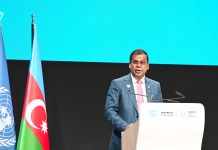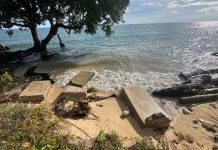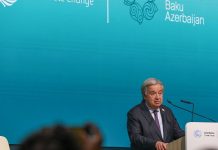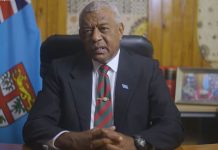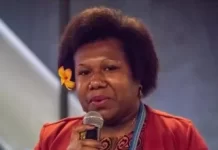
Climate disasters and gender violence are amongst the biggest threats causing poverty in the Pacific, and worsening gender inequality, says the Pacific Islands Forum.
In a PIF statement at CSW 68 in New York today, Tonga’s Minister for Internal Affairs Lord Vaea noted while the region has made some progress on gender equality, more needs to be done.
He pointed to impacts from the global climate crisis and violence against woman as two key challenges.
“Climate change and disasters have affected crop production, contributing to food insecurity. In addition, shifting rainfall patterns and salinity intrusions significantly impact access to clean and safe water for consumption,” Lord Vaea said, “Gender-based violence continues to be an endemic problem in our region and contributes to women’s increased economic hardship and limited access to income and timely and essential services including access to justice. This is exacerbated by the impacts of climate change, cybercrime, and the illicit drug trade.”
The economic inequalities facing Pacific women were also a key challenge shared in the Pacific Islands Forum statement to the plenary session of the UN Commission on the Status of Women.
“In some of our countries, women-headed households make less money and are more likely to experience financial hardship and live in poverty. Many women in the Pacific work in the informal economy, including the tourism and the cultural industries sector, with limited social protection such as childcare, pension schemes and insurance. Many women often lack opportunities to access training, skills, and collateral and start up finance,” Lord Vaea said, adding specific calls for support to women and girls to help them overcome climate change impacts and grow the ‘green and blue’ economy.
The PIF statement also called for countries to “recognise the link between poverty and gender-based violence and the protection of women’s human rights. We affirm that the economic empowerment of women can be a catalyst for women’s health, wellbeing and safety.”
Lord Vaea noted the ownership of the region and its innovative financing mechanism, the Pacific Resilience Facility, and gender-responsive social protection schemes, including those working in the informal economy.
The PIF statement called on all partners, including the UN system, “to support the Pacific to implement the 2050 Strategy and revitalized Pacific Leaders Gender Equality Declaration, to ensure that any investments and partnerships will support national and regional initiatives and guarantee lifelong learning, health, security, and wellbeing of all Pacific peoples in all their diversity.”
CSW 68’s theme is Accelerating the achievement of gender equality and the empowerment of all women and girls by addressing poverty and strengthening institutions and financing with a gender perspective.
Pacific Islands Forum heads of delegations have been meeting ahead of the opening plenary, and their national statements will feature amongst the many status updates on gender to the CSW.
For the PIF statement, the 2050 Strategy for the Blue Pacific Continent and revived Pacific Leaders Gender Equality commitment have been flagged as the key political drivers for progress, with a promise to place people at the centre.
“Despite the great challenges faced by the Pacific including the stronger and more frequent impacts of climate change and disasters; high rates of non-communicable diseases; gender-based violence; and plastics and pollution in our ocean; we know we are a region of great strengths – through our faith, diverse cultures, resilience, ocean and land resources, and connection as people of the Blue Pacific, Lord Vaea noted, “We know collectively, we can achieve our 2050 vision,” he said.



